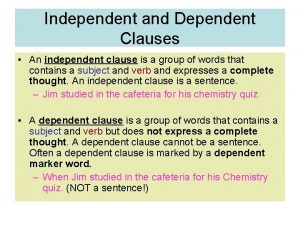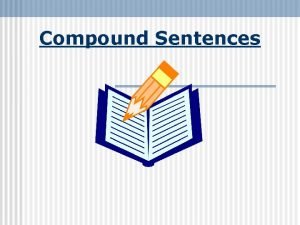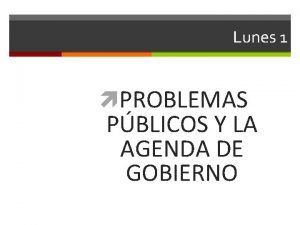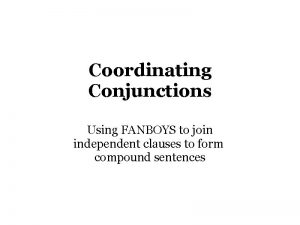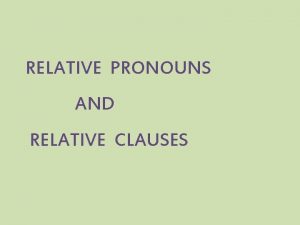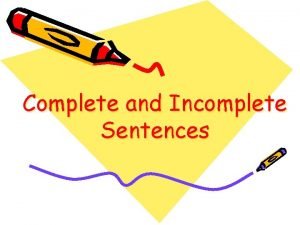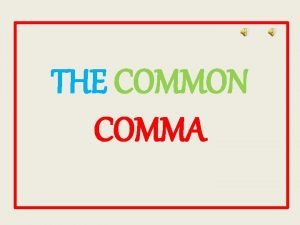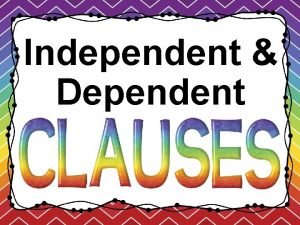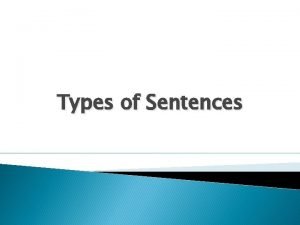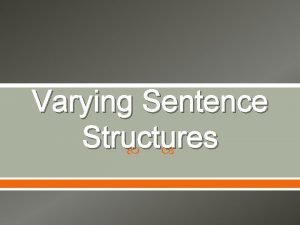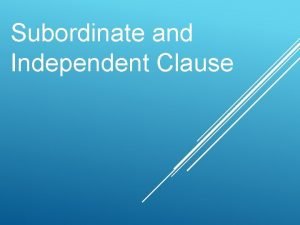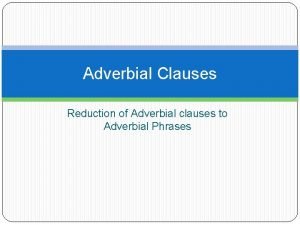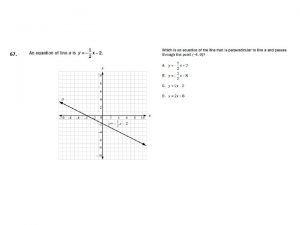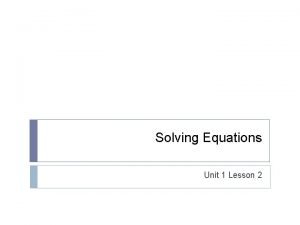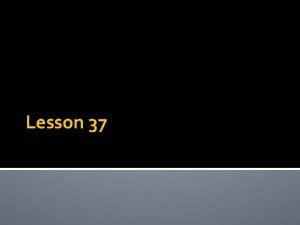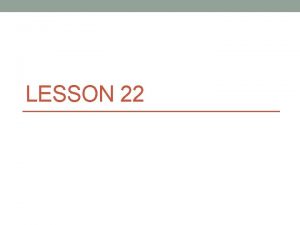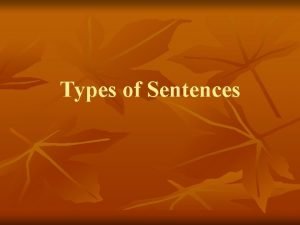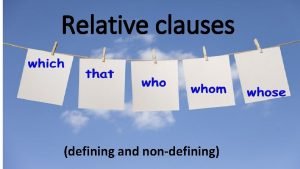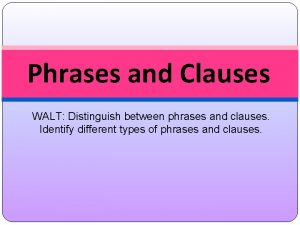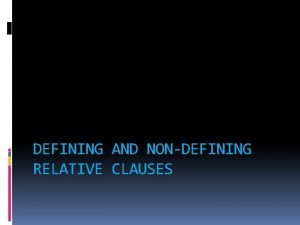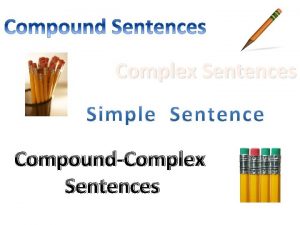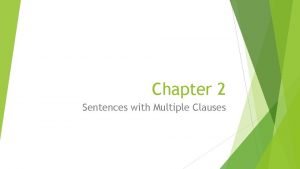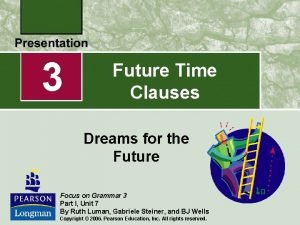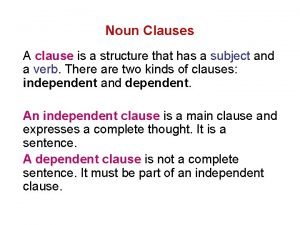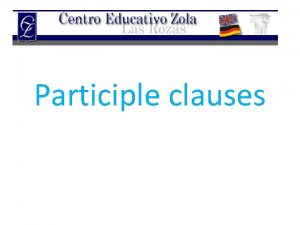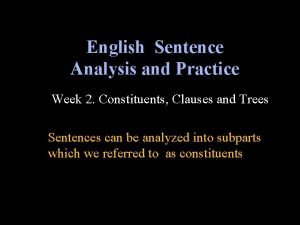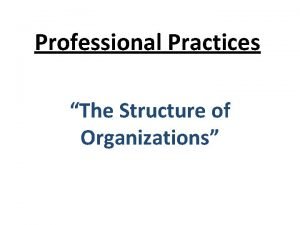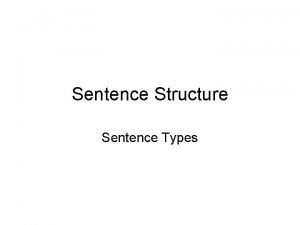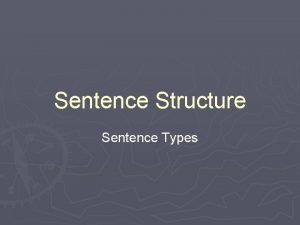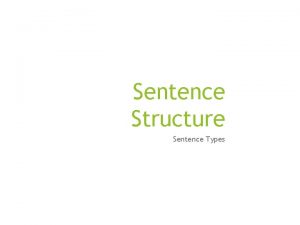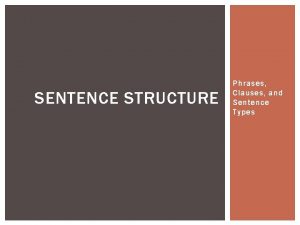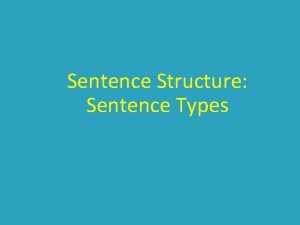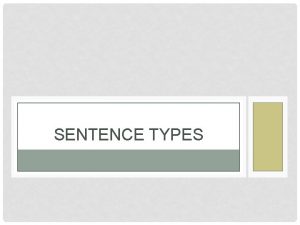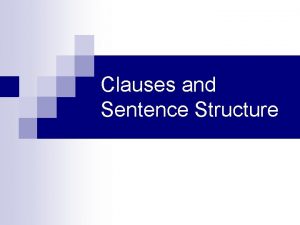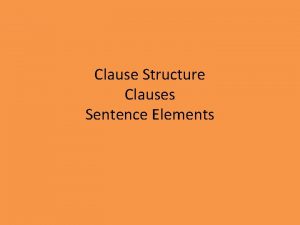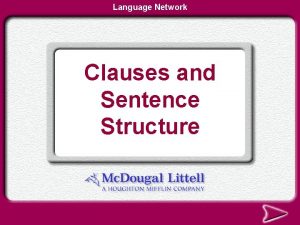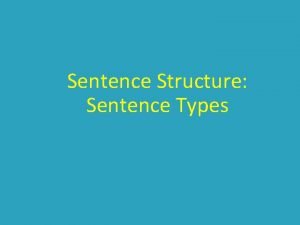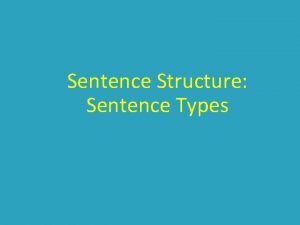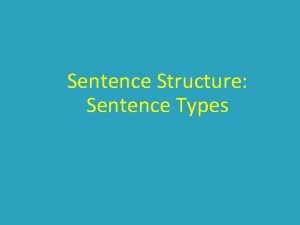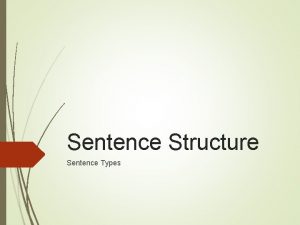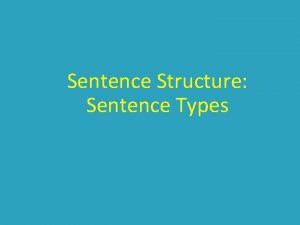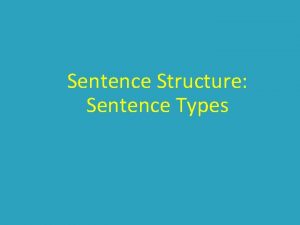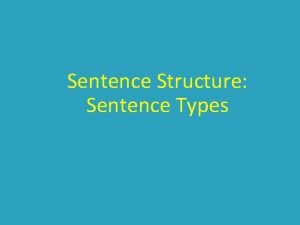Agenda Clauses Sentence Structure Practice Clauses Independent Or







































- Slides: 39

Agenda • Clauses • Sentence Structure • Practice!

Clauses • Independent • Or • Dependent

Independent Clauses • A clause that can stand alone as a short sentence • Ex. Jim ran track.

Dependent Clause • Contains subject and verb • Not a complete thought • Ex. When Jim studied in the Sweet Shop for his chemistry quiz. – What happened next? Not a complete thought

You know it’s dependent when… • after, although, as if, because, before, even if, even though, if, in order to, since, though, unless, until, whatever, whenever, whether, and while.

Which is which? • When Jim ran track, he stayed in really good shape. • Jim studied in the Sweet Shop for his chemistry quiz, but it was hard to concentrate because of the noise.

You know it’s independent when… • Independent Marker Words – also, consequently, furthermore, however, moreover, nevertheless, and therefore. • Coordinating Conjunctions – and, but, for, nor, so, and yet – Connecting words at the beginning of independent clauses

Sentence Structure • • Simple Compound Complex Compound-Complex

Simple • One Independent Clause • Ex. The designer has a flair for fashion.

Compound • Contains more than one independent clause • Ex. The designer has a flair for fashion; she creates clothes every season

Complex • One independent clause and at least one dependent clause • Ex. When the spring fashion season beins, the designer creates new clothes

Compound-Complex • Contains more than one independent clause & at least one dependent • Ex. When the spring fashion season begins, the designer draws new designs, and she creates new clothes.

Sentence Types • • Declarative Imperative Interrogative Exclamatory

Declarative • Makes a statement and ends with period • The baker mixed the ingredients for the cake.

Imperative • Gives a command or order • Subject is always “you” (expressed or understood) • Be careful when walking near teething puppies.

Interrogative • Asks a question • Will you bake a cake for me?

Exclamatory • • Expresses strong feelings or emotions More forceful than declarative Explanation Point! I love birthday parties!

Agenda • Phrases, clauses, sentences

Phrases • Usually no more than 3 words long • Do not have subjects, finite verbs or objects • Function is purely descriptive (adding extra detail about nouns and verbs) • Types: adjectival, adverbial, infinitival, participial, prepositional, gerund

Clauses • Dependent (subordinate) or Independent (main or superordinate) • Main grammatical chunks of a sentence • Dependent: either relative (adjectival), adverbial, or noun clauses • ALL clauses have subjects and predicates whether explicit or implicit

Sentence • Rhetorical Unit • Must have at least one independent clause (simple sentence) • With or without dependent clauses or phrases • Or may contain 2 or independent clauses (compound), one or more dependent clauses (complex), and possibly, phrases (compound/complex)

Prepositional Phrases • Take me to the opera. • What is in the box that came from Hawaii?

Prep. Phrases that function as adjectival phrases • The woman on the phone is Jane. (describe woman) • The mysteries of outer space are waiting for us. (describes mysteries)

Prep. Phrases that function as adverbs • Bob was caught on the horns of a dilemma. (describes how) • A large rabbit dove under the ground. (describes where)

Prep. Phrases that function as a complex noun (subject) • In the evening (it) is as good a time as any. (‘what’ is a good time? )

Gerund Phrases • Gerunds are verb forms ending in ‘ing’ that function as nouns • Reading blueprints is not as easy as it sounds. (subject) • Thoreau placed great value on living simply. (object of preposition) • Having missed the bus, we arrived late at the party (participial phrase/modifier for ‘we’)

Infinitival Phrase • Can function as a noun phrase, adjectival or adverbial • A waiter’s job is to serve a table. (answer ‘what’ = function as noun phrase) • It’s important to have a good language to suit the occasion. (functioning as adjectival phrase)

Infinitival Phrase • We’ll have to run to catch the train. (functioning as an adverbial phrase – answer ‘why’) • We hope to win the race. (infinitival phrase functioning as object of the verb = noun phrase)

Finite verbs vs. Infinitive • Finite = always has an implicit or explicit subject – Becomes finite when gets confined by the noun – Connected to by number, ‘person’, or tense • Infinitive = pure, unaffected verb forms – Not tied to any noun, subject, or object – Always have the preposition ‘to’ – This form never acts as a verb

Examples finite vs. infinitive • To sing is a good thing when we are singing uplifting songs.

Participial Phrase • Typically used as adjective to modify noun or pronoun • The gentlemen standing on the corner is the owner (modifies gentlemen) • The fisherman, weathered by experience, calmly took the line. (modifies fisherman)

Participial Phrase • Missing the bus by a second, we decided to take a taxi. (Modifies ‘we’) • Running into the house, Mary tripped on the rug. (modifies Mary) • Incorrect placement of the participial phrase typically results in what we term the ‘dangling modifier’ – in this case, the dangling participial phrase

Adjectival Clause • Follows a noun • Phrase will begin with who, which, that, whose, whom • Ex. Margaret, who loves chocolate, eats a lot of it. • The function of the words is what matters

Adverbial Clause • Do the work of adverbs • Extend description of the finite verb in the independent clause • Tell us: how, when, where, or why something happens • Because she loves chocolate, she eats many. (tells us why) • During the time he ran frequently, he lost 15 pounds. (when)

Noun Clause • Subject or object • That the moon has no heat of its own (it) has been confirmed by scientists. (subject) • It is obvious that truth is hard to come by with habitual liars. (object)

Appositives • Has to do with placement or location • Can be a word or phrase • Any single word or phrase (or dependent clause) is appositional only when it is placed • *A noun or pronoun that renames another noun or pronoun • Most commonly, a noun or pronoun appearing immediately after another noun • The noun or pronoun used appositively, seems to bend back to RENAME previous noun

Appositives • Frequently offset by commas, although not always the case • Woodrow Wilson, the twenty-ninth president of the USA, said that automobiles symbolized the ‘arrogance of wealth. ’ • Noun that bend back is embedded in the whole phrase, so the phrase too is appositively place

Comma or No Comma? • Restrictive = essential to meaning – No commas, can’t take out, necessary • Nonrestrictive – Non-essential

Friday, 1/20 • Learning Lab: Editing/Labeling
 What's a dependent clause
What's a dependent clause Independent and dependent clauses practice
Independent and dependent clauses practice A sentence with two independent clauses
A sentence with two independent clauses Agenda sistemica y agenda institucional
Agenda sistemica y agenda institucional Fanboys connectors
Fanboys connectors Relatives clauses examples
Relatives clauses examples Major supporting sentence
Major supporting sentence Examples of complete and incomplete sentences
Examples of complete and incomplete sentences Dependent clause and independent clause
Dependent clause and independent clause What is a dependent clause
What is a dependent clause Comma before however
Comma before however Independent clause examples
Independent clause examples What is a parenthetical expression
What is a parenthetical expression Independent clause
Independent clause Varying sentence structures
Varying sentence structures Decide whether each group of words is a clause
Decide whether each group of words is a clause 4.01 quiz: independent dependent and noun clauses
4.01 quiz: independent dependent and noun clauses Dependent clause noun
Dependent clause noun Restrictive clause
Restrictive clause Adverb clause reduction
Adverb clause reduction How to tell if two events are independent
How to tell if two events are independent Sadmeg math
Sadmeg math Independent practice: topographic maps
Independent practice: topographic maps Agenda in a sentence
Agenda in a sentence Agenda in a sentence
Agenda in a sentence What is an independent clause in a sentence
What is an independent clause in a sentence Define complex sentence
Define complex sentence Nondefining relative clause
Nondefining relative clause Phrase
Phrase Prepositions in relative clauses
Prepositions in relative clauses Compound-complex
Compound-complex Multiple clauses in a sentence
Multiple clauses in a sentence Myeplg
Myeplg Future tense of dream
Future tense of dream Structure of noun clause
Structure of noun clause Participle clasues
Participle clasues Underlined errors
Underlined errors Trees sentence in english
Trees sentence in english Sentence variety practice
Sentence variety practice Structure of organization in professional practice
Structure of organization in professional practice
